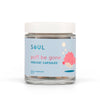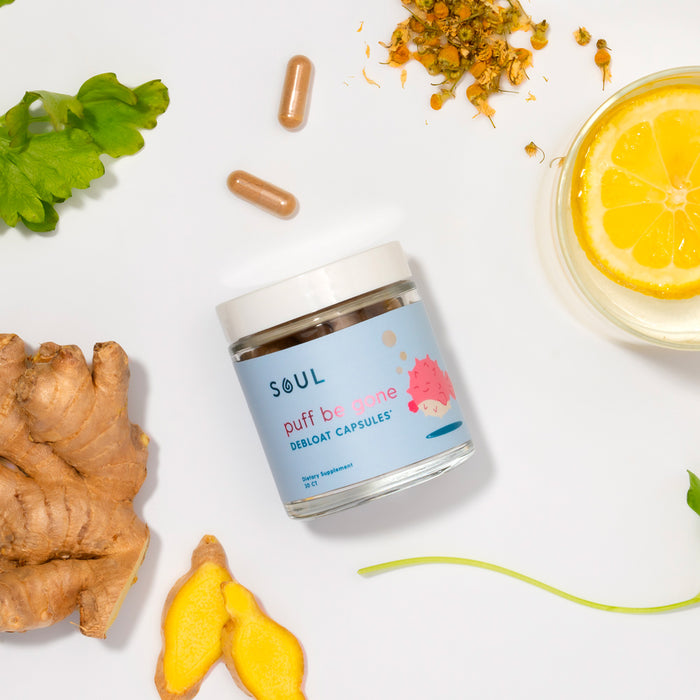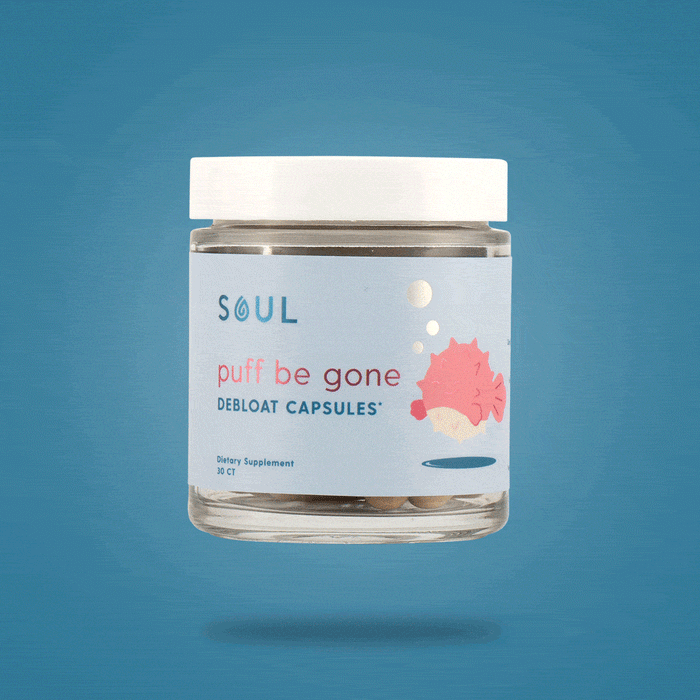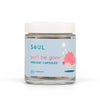
Puff Be Gone Capsules
The Upside
See Ya Bloat
Balance Your Gut

Safe Ingredients
How to Use
- Take 1-2 before a meal (or when you feel bloated).
- Give bloating the 1-2 punch.
- Don’t be afraid to eat the bread.

When your gut is off, everything is off. Get back on with Soul’s Puff Be Gone Capsules. Formulated with a unique combination of natural herbs, these capsules give a one-two punch to your belly bloat; treating immediate symptoms of bloating and supporting long-term healing in your gut for fewer instances of bloating over time.
The formulation includes CBG (The Mother Cannabinoid) to relieve intestinal inflammation, dandelion root to reduce bloat and balance the liver, ginger for nausea, and a blend of natural digestive enzymes to help your digestive process going forward.
Everyone is Talking
Custom content
.
What Are Bloating Relief Pills?
Bloating relief pills are over-the-counter medications designed to alleviate symptoms of bloating, which is often characterized by a feeling of fullness, tightness, or swelling in the abdomen. These pills work by targeting the various causes of bloating, such as gas buildup, indigestion, and water retention. Bloating relief pills typically contain a blend of ingredients that help to break down gas bubbles, improve digestion, and reduce water retention, providing quick and effective relief from discomfort.
How Do Bloating Relief Pills Work?
Bloating relief pills work through a combination of mechanisms depending on their active ingredients. Here are some common ways they function:
Breakdown Of Gas Bubbles
Ingredients like simethicone work by breaking down gas bubbles in the stomach and intestines. Simethicone is an anti-foaming agent that causes gas bubbles to coalesce, making it easier for the body to expel the gas naturally through belching or flatulence. This process provides quick relief from the discomfort and pressure caused by gas buildup.
Improving Digestion
Digestive enzymes such as amylase, lipase, and protease can be included in these pills to help break down carbohydrates, fats, and proteins more efficiently. By enhancing the digestive process, these enzymes prevent the accumulation of undigested food in the intestines, which can ferment and produce gas. This improved digestion can significantly reduce bloating and promote a healthier digestive system overall.
Reducing Water Retention
Some bloating relief pills contain diuretic ingredients like dandelion root or potassium that help the body eliminate excess water. Water retention can cause bloating and swelling, particularly in the abdomen. By promoting the excretion of excess fluids through urine, these diuretic ingredients help reduce bloating and the sensation of heaviness associated with water retention.
Alleviating Indigestion
Antacids or other compounds that neutralize stomach acid can be included to alleviate indigestion. Indigestion, or dyspepsia, can cause bloating, discomfort, and a feeling of fullness. By neutralizing excess stomach acid, antacids reduce the irritation and inflammation of the stomach lining, providing relief from bloating and other indigestion symptoms.
Probiotics
Certain pills may also include probiotics, which promote a healthy balance of gut bacteria. An imbalance in gut flora can lead to digestive issues such as gas production and bloating. Probiotics help maintain a healthy microbial balance, aiding digestion and reducing the likelihood of gas and bloating. They also support overall gut health, which can have long-term benefits for digestive comfort.
What Are Some Common Ingredients In Bloating Relief Pills?
Bloating relief pills often contain a variety of active ingredients that target different causes of bloating. Some common ingredients include:
Simethicone
An anti-foaming agent that reduces bloating by breaking down gas bubbles in the gut. Simethicone works by decreasing the surface tension of gas bubbles, causing them to merge into larger bubbles that are more easily expelled from the body. This can provide rapid relief from the discomfort and pressure associated with excessive gas in the digestive tract.
Activated Charcoal
Helps to absorb gas and toxins in the digestive tract, reducing bloating and discomfort. Activated charcoal has a porous surface that traps gas molecules, which can help alleviate bloating caused by gas. Additionally, it can bind to toxins and impurities, potentially reducing digestive issues that contribute to bloating and promoting overall digestive health.
Digestive Enzymes
Enzymes like amylase, protease, and lipase help break down food more efficiently, preventing the buildup of gas and undigested food. By aiding in the complete digestion of carbohydrates, proteins, and fats, these enzymes reduce the fermentation of undigested food in the intestines, which is a common cause of gas and bloating. Improved digestion can lead to less discomfort and a more balanced digestive process.
Probiotics
Beneficial bacteria that promote a healthy balance of gut flora, aiding digestion and preventing bloating. Probiotics can help restore and maintain the natural balance of microorganisms in the gut, which is essential for efficient digestion and nutrient absorption. A healthy gut microbiome can prevent the overgrowth of gas-producing bacteria, thereby reducing bloating and improving overall digestive health.
Herbal Extracts
Ingredients like ginger, peppermint, and fennel are known for their digestive benefits and can help soothe the digestive tract and reduce gas. Ginger has anti-inflammatory properties and can stimulate digestive enzymes, while peppermint relaxes the muscles of the gastrointestinal tract to ease gas passage. Fennel helps expel gas and improve digestion, making these herbs effective natural remedies for bloating.
Diuretics
Natural diuretics like dandelion root and parsley help reduce water retention, which can contribute to bloating. By promoting the elimination of excess fluids through increased urine production, these ingredients can reduce the sensation of fullness and swelling associated with water retention. This can be particularly beneficial for individuals who experience bloating due to hormonal changes or high sodium intake.
Antacids
Ingredients like calcium carbonate or magnesium hydroxide neutralize stomach acid, alleviating indigestion-related bloating. By reducing the acidity in the stomach, antacids can prevent the discomfort and bloating that result from acid indigestion. These compounds provide quick relief by neutralizing excess stomach acid and soothing the digestive tract.
What Are The Benefits Of Using Bloating Relief Pills?
Using bloating relief pills can offer several advantages for those who frequently suffer from bloating. Some key benefits include:
Quick Relief
Bloating relief pills can provide fast-acting relief from discomfort, often within minutes to a few hours after taking them. This immediate effect is particularly beneficial when bloating occurs unexpectedly or causes significant discomfort, allowing individuals to quickly resume their daily activities without prolonged distress.
Convenience
These pills are easy to use and can be taken on-the-go, making them a convenient option for busy individuals. They typically come in portable forms such as tablets or capsules, which can be easily carried in a bag or pocket and taken whenever needed, ensuring that relief is always within reach.
Targeted Action
The ingredients in bloating relief pills are specifically designed to target the causes of bloating, whether it’s gas, indigestion, or water retention. This targeted approach ensures that the treatment is effective and tailored to the specific cause of bloating, providing a more efficient and focused remedy compared to general digestive aids.
Improved Digestion
Many bloating relief pills contain digestive enzymes and probiotics, which can enhance overall digestive health and prevent future episodes of bloating. By promoting better digestion and a healthy gut flora balance, these pills not only relieve current symptoms but also help to maintain digestive health in the long term, reducing the likelihood of recurrent bloating.
Reduced Discomfort
By alleviating the symptoms of bloating, these pills can help improve comfort and quality of life, especially after meals. Regular use can lead to fewer disruptions in daily life caused by bloating discomfort, allowing individuals to enjoy their meals and daily activities without the constant worry of bloating.
Variety Of Options
There are numerous formulations available, allowing individuals to choose a product that best suits their specific needs and preferences. Whether someone prefers natural ingredients, needs a lactose-free option, or requires a specific enzyme blend, the variety of products on the market means there is likely a bloating relief pill that fits their unique requirements and lifestyle.
What Are Some Potential Side Effects Of Bloating Relief Pills?
While bloating relief pills can be effective, they may also come with some potential side effects. It's important to be aware of these before using them:
Digestive Issues
Some individuals may experience diarrhea, constipation, or stomach cramps as a reaction to certain ingredients. These digestive disturbances can result from the body's adjustment to new substances or from specific components that may irritate the digestive tract. Monitoring your body's response and adjusting the dosage or discontinuing use if necessary can help mitigate these side effects.
Allergic Reactions
Ingredients like herbal extracts or probiotics can cause allergic reactions in some people, leading to symptoms such as rash, itching, or swelling. It's crucial to read ingredient labels carefully and be aware of any personal allergies. In case of an allergic reaction, it's important to discontinue use immediately and seek medical advice to avoid more severe complications.
Electrolyte Imbalance
Diuretics in bloating relief pills can lead to an imbalance in electrolytes, causing symptoms like dizziness, headache, or muscle cramps. Diuretics increase urine production, which can deplete essential electrolytes like potassium and sodium. Maintaining a balanced diet and staying hydrated can help manage these side effects, but it's wise to consult with a healthcare provider if symptoms persist.
Drug Interactions
Bloating relief pills may interact with other medications, potentially altering their effectiveness or causing adverse effects. Ingredients like activated charcoal can absorb other medications, reducing their efficacy. Always consult with a healthcare provider before combining bloating relief pills with other treatments to ensure there are no harmful interactions.
Overuse Risks
Relying too heavily on bloating relief pills can lead to dependence and may mask underlying digestive issues that need medical attention. Chronic use without addressing the root cause of bloating can result in prolonged discomfort and potentially more serious health issues. Seeking medical advice for persistent bloating is essential for identifying and treating any underlying conditions.
Nutrient Absorption
In some cases, ingredients like activated charcoal may interfere with the absorption of nutrients and medications. Activated charcoal works by binding substances in the digestive tract, which can include essential vitamins and minerals, as well as medications. This can lead to deficiencies and reduced effectiveness of other treatments, so it's important to use such ingredients sparingly and under guidance.
What Are Some Tips For Preventing Bloating?
Preventing bloating can help you avoid discomfort and the need for relief pills. Here are some effective tips to keep bloating at bay:
Eat Slowly
Taking your time to eat and chewing food thoroughly can reduce the amount of air swallowed, which helps prevent gas buildup. Eating too quickly can lead to swallowing air along with food, which gets trapped in the digestive tract and causes bloating. By slowing down and savoring each bite, you can improve digestion and reduce the likelihood of experiencing gas and bloating.
Avoid Carbonated Beverages
Drinks like soda and sparkling water can introduce excess gas into your digestive system, leading to bloating. The carbonation in these beverages releases carbon dioxide gas in the stomach, which can accumulate and cause discomfort. Opting for still water or herbal teas can help minimize this effect and keep your digestive system more comfortable.
Monitor Fiber Intake
While fiber is essential for digestive health, too much fiber can cause bloating. Gradually increase your fiber intake to allow your body to adjust. Incorporating fiber slowly gives your digestive system time to adapt, reducing the risk of gas and bloating. Also, balancing soluble and insoluble fiber can help maintain smooth digestion.
Stay Hydrated
Drinking plenty of water aids digestion and can help prevent constipation, which is a common cause of bloating. Proper hydration ensures that your digestive system functions efficiently, helping to move food through the intestines and preventing the buildup of gas. Aim to drink at least eight glasses of water a day, and more if you are active or live in a hot climate.
Limit Salt Intake
Excessive salt can cause water retention, contributing to bloating. Reducing salt in your diet can help prevent this. High sodium levels lead to the body retaining more water to balance the salt, which can cause a bloated feeling. Cooking with herbs and spices instead of salt can enhance flavor without the added sodium.
Avoid Gas-Producing Foods
Foods like beans, lentils, and certain vegetables (such as broccoli, cabbage, and onions) can cause gas and bloating. Moderation or avoidance may help. These foods contain complex carbohydrates and fibers that can be difficult to digest, leading to fermentation and gas production in the intestines. Cooking these foods thoroughly and consuming them in smaller portions can reduce their bloating effects.
Exercise Regularly
Physical activity can help move gas through the digestive tract more quickly, reducing bloating. Even a short walk after meals can be beneficial. Regular exercise stimulates the muscles of the gastrointestinal tract, promoting more efficient digestion and helping to prevent constipation and gas buildup.
Consider Probiotics
Incorporating probiotic-rich foods or supplements into your diet can help maintain a healthy balance of gut bacteria, aiding digestion and reducing bloating. Probiotics such as yogurt, kefir, sauerkraut, and kimchi introduce beneficial bacteria that support a balanced gut microbiome, enhancing digestion and reducing the risk of bloating caused by microbial imbalances.
Manage Stress
Stress can affect your digestive system and contribute to bloating. Practicing relaxation techniques like deep breathing, meditation, or yoga can help manage stress levels. Stress can lead to digestive issues like irritable bowel syndrome (IBS), which often includes bloating as a symptom. Regularly engaging in stress-reducing activities can promote a healthier digestive system and reduce the frequency and severity of bloating episodes.
Sources:
- Lacy, B. E., Gabbard, S. L., & Crowell, M. D. (2011). Pathophysiology, Evaluation, and Treatment of Bloating. Gastroenterology & Hepatology, 7(11), 729–739. https://www.ncbi.nlm.nih.gov/pmc/articles/PMC3264926/
- Contributors, W. E. (n.d.). Remedies for Bloating. WebMD. https://www.webmd.com/digestive-disorders/remedies-for-bloating
- Seo, A. Y., Kim, N., & Oh, D. H. (2013). Abdominal Bloating: Pathophysiology and Treatment. Journal of Neurogastroenterology and Motility, 19(4), 433–453. https://doi.org/10.5056/jnm.2013.19.4.433









